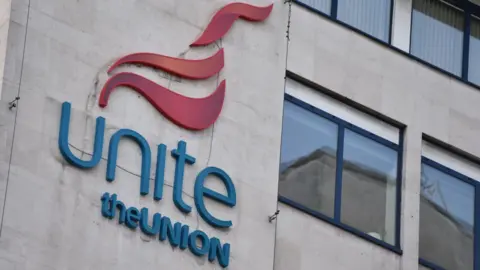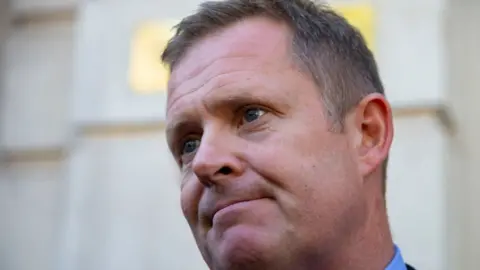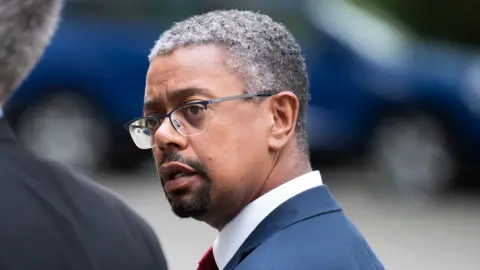Welsh Labour leadership nomination a shocking mess - Unite official
 Getty Images
Getty ImagesA trade union's decision that Education Minister Jeremy Miles was ineligible for its Welsh Labour leadership nomination left officials in shock, a union representative has said.
The member who interviewed both leadership candidates said the decision left a "lot of unhappy people".
They said Unite was trying to flex a power it no longer had.
Unite, which has nominated Mr Miles's rival, Economy Minister Vaughan Gething, declined to comment.
BBC Wales has spoken to a member of Unite's political committee about the chain of events a fortnight ago which led to the nomination of Mr Gething.
The member said that they did not think a change of Unite's eligibility rules agreed last summer was applicable in the contest.
 Getty Images
Getty Images"There was complete shock when we were told that only one of the candidates was eligible," the member said.
"We have got to remember who the electorate is. This is one member one vote: that's the reality."
Referring to when unions had big block votes in Labour contests of the past, the member said: "This is a bit of a flex of power that they don't have any more."
The representative doubted that the union will step in, but said there were a lot of unhappy people.
"The actions were divisive and misleading," they added.
The argument appears to boil down to the interpretation of the rule change agreed at Unite's conference last summer that the union would only endorse candidates who had held elected lay office as representatives of workers.
But there is now a dispute as to whether the wording of the rule change applies to elections to nominate the next leader of Welsh Labour. Supporters of the union's position have told BBC Wales that it does.
Unite said it was not making further comment on the matter.
 PA Media
PA MediaThe union has not responded to further questions about whether the rule change was applicable and whether Mr Miles had been told before the hustings began.
In the statement last Friday a spokesperson said: "During the Unite Wales Labour Party liaison committee meeting, the nominee in question was interviewed and his suitability considered.
"However, Unite's rules conference last year decided that Unite 'will only formally endorse candidates who have held elected lay office as representatives of workers'. Under this rule he was ineligible for nomination.
"Unite is satisfied that the nomination process was carried out correctly."
Why does union support matter?
Welsh Labour moved to a system of one member one vote to elect its leader back in 2018, meaning all party members - and members of unions and affiliated groups - get an equal vote.
Previously there was a college system, which had split leadership election votes three ways between members, unions and politicians.
However union backing can still be a powerful weapon in a candidate's armoury, because members of Labour-affiliated unions get to vote in the leadership election.
It gives the nominated candidate access to the union's members, whether that be through mailing lists or organised in-person meetings.
The union would also be expected to contact its members and campaign for the candidate.
Unions can also provide help with resources such as office space or even setting up phone banks to contact members and urge them to vote.
Both candidates' camps are working on the assumption that there could be between 90,000-100,000 affiliated union members in Wales.
In what could be a tight contest, albeit with a low turn-out from affiliated members, their votes could nonetheless be crucial in determining the outcome.


